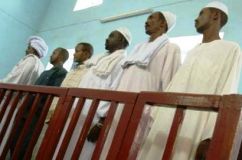Premature to lift immunity of people accused of crimes in Darfur, minister
KHARTOUM, Sudan, Feb 15, 2005 (AP) — Sudan’s justice minister said Tuesday that it was premature to demand a lifting of immunity from some officials so they can be tried for alleged crimes committed in Darfur.

|
|
Six Sudanese men stand in the dock in a court in Nyala September 30, 2004, accused of belonging to the Arab militia. (Reuters). |
Ali Mohamed Osman Yassin was responding to comments by U.N. envoy Jan Pronk, who was quoted in a local newspaper Monday as urging the government to lift immunity on its own before a request was officially made.
“The request … is premature because those accused are not known and the charges are not specified,” Yassin was quoted by the official SUNA news agency as saying.
Yassin said if Pronk offered specific charges against specific people, “then the government of Sudan is ready to bring them to trial inside Sudan.”
Earlier this month, a U.N. commission report recommended 51 Sudanese — including high-ranking government officials, rebels and Arab militiamen known as the Janjaweed — stand trial at the International Criminal Court on war crimes charges related to the two-year Darfur conflict.
Sudanese Vice President Ali Osman Mohammed Taha rejected the idea, telling a rally last week that “a trial of some individuals or officials in courts outside the Sudan is something we will not accept as a government.”
Italian law professor Antonio Cassese, the chair of the panel that produced the Darfur report, said the 51 names were sent to U.N. Secretary-General Kofi Annan in a sealed envelope.
The identities of about 40 more individuals with less evidence gathered against them have been sent to the U.N. Commissioner for Human Rights for possible further investigations, Cassese told The Associated Press in Egypt in a telephone interview last week.
The panel’s report also said government-backed militias were still involved in rape, mass killings and wanton destruction in Darfur, a region the size of France where fighting has left at least 70,000 people dead since last March and forced more than 2 million displaced from their homes.
The Darfur conflict began when the rebels took up arms against what they saw as years of state neglect and discrimination against Sudanese of African origin. The government is accused of responding with a counterinsurgency campaign in which the Janjaweed committed wide-scale abuses against the African population.
